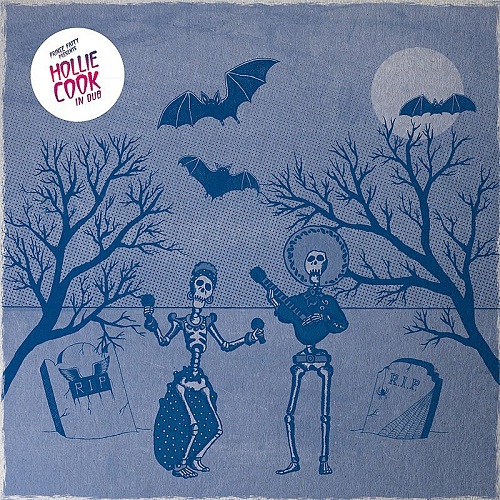Reviews June 4, 2012
Hollie Cook in Dub
Dub’s radical reworking of the basic logic of song structure has been an element of popular music for long time now. So much so, that much of dub's initial impact has long been blunted by familiarity. Pop songs, looped through the endless transformations of DJ sets and remixes, no longer have anything resembling the stability of a fixed form, expanding and contracting to fit their circumstances. Taking full advantage of modern studio technology, pop songs no longer inhabit a single sonic environment, moving freely between different versions of audio reality in a manner directly presaged by Dub’s shattering echoes.
Given all of this, it isn’t too surprising that dub has moved to the margins of a remix-culture that it did a great deal to spawn. Dub is also, of course, a musical genre as a much as an aesthetic/compositional strategy, and in this sense, it is still possible to make an excellent album in its classic style. This sort of endeavor is, despite the good intentions that often accompany it, almost always a exercise in sonic nostalgia, a rehashing of classic Tubbyisms. “Hollie Cook in Dub,” presented by Prince Fatty, escapes the shadow of any such criticism.
Instead of creating a new dub album from scratch, Prince Fatty applies the full-scale dub treatment to a modern pop-reggae record that employs basic structures already heavily influenced by the dub logics. Utilizing this source material, the album amplifies an aspect that was already present within the songs rather than working a process on top of an already existent track. Working with the music this way allows Fatty to maintain the songs as songs. Take the opening cut, “Shadow Dub,” which is based on the “Shadow Kisses” from Cook’s self-titled debut. As the opening lines of “Shadow-kissing you/From my balcony” dissolve into a sea of echoes, the lyrical meaning is doubled through the drama of their dissolve. The song then kicks into the churn of drum and bass that exemplifies traditional dub, a steady feel constantly overturned by the unpredictable clatter of cymbals and the occasional interjection of organ and guitar. Cook’s voice moves in and out of the mix, dropping the occasional phrase before relinquishing her position. Yet unlike many dub versions, these cuts don’t seem overly harsh, never interrupting the natural flow of the singer. Instead, it feels as if each appearance delivers the entirety of the necessary vocal presence; anything more would upset the ghostly presence of the music.
The only problem with the album is its short running time of 35 minutes. Given the way in which dub stretches out its sound sources, and the general vibe of the music overall, its might have benefited from a less succinct offering. As it is, the album’s end comes abruptly (albeit at a high point), shattering the rhythmic spell that it effortlessly cast. At which point you will likely sigh, take it all in for a minute, and then put it back on again from the top.
[soundcloud url="http://api.soundcloud.com/playlists/1851645" height="200" iframe="true" /]









